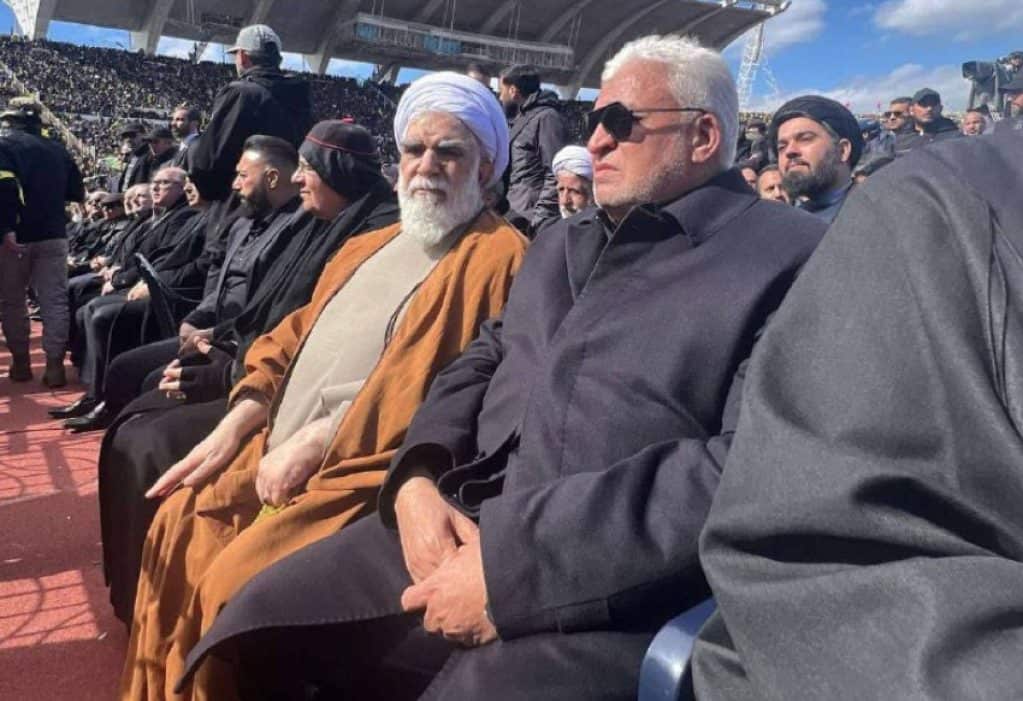
Delegations and leaders of pro-Iranian Iraqi militias traveled to Lebanon for the funeral of the late Hezbollah leader Hassan Nasrallah on February 23. The funeral has seen a large turnout in Lebanon at Beirut’s Camille Chamoun Stadium. Iranian state media and pro-Iranian media in the region highlighted a large turnout, emphasizing that the stadium was full and spotlighting speeches by Iranian officials and other pro-Iranian voices. The participation of Iraqis in the funeral underscores Iran’s influence in Iraq.
On the morning of February 23, a Telegram channel associated with the Popular Mobilization Units (PMU) released a photo of PMU Chairman Falih al Fayyadh and Chief of Staff Abdul Aziz al Mohammedawi, known by the nom de guerre Abu Fadak, traveling to Beirut via Baghdad International Airport. The photo was also posted on X with commentary in Arabic about these key Iraqi militia leaders heading to Lebanon. The PMU later posted about Fayyadh’s funeral attendance on its website. Fayyadh traveled to Beirut after returning to Baghdad last week after a trip to Tehran for key meetings about the future of the PMU in Iraq.
Mohammedawi took over as head of Kataib Hezbollah in 2020 after the former head of the group, Abu Mahdi al Muhandis, was killed alongside Islamic Revolutionary Guard Corps-Quds Force (IRGC-QF) leader Qasem Soleimani in a US drone strike. Kataib Hezbollah is a key militia in the PMU and very close to the IRGC. Since 2021, Mohammedawi has been sanctioned by the US as a Specially Designated National and Blocked Person under the Office of Foreign Assets Control.
Among other Iraqi militia members who appear to have traveled to Beirut was Muhammad Tabatabai, the deputy secretary general of Asaib Ahl al Haq (AAH). A video posted online shows him at the site in Beirut where Nasrallah was killed by an Israeli airstrike on September 27.
The same video also stated another AAH senior member, Jawad al Talibawi, was with Tabatabai. Talibawi has been a spokesperson for the group and a key figure over the years. In 2022, the head of AAH, Qais Khazali, appointed Talibawi to a committee to investigate killings in Iraq’s Maysan Governorate. Tabatabai has represented AAH in past events in Tehran commemorating Soleimani and Muhandis.
AAH leader Khazali did not come to the funeral but put out a statement about it, apparently broadcast from Iraq. The Iranian-state Islamic Republic News Agency (IRNA) noted that Khazali said Nasrallah was a “great man who spent his entire life in the path of jihad and defense of the oppressed.” Khazali also said, “We pledge to martyr Nasrallah that we will continue on this path until the land is cleansed of the usurping Zionist regime.” The statement was also issued in a video posted on IRNA’s Arabic site. Khazali has been to Lebanon in the past. In 2017, he toured southern Lebanon and viewed the border with Israel, illustrating his support of Hezbollah against Israel.
Another key Iraqi militia leader, Abu Alaa al Walai, secretary-general of the Kataib Sayyid al Shuhada militia, also put out a statement on the funeral, according to Hezbollah’s Al Ahed News. Walai did not appear to attend the event in person.
Also present in Beirut was Seyed Mojtaba Hosseini, the representative of Iranian Supreme Leader Ali Khamenei in Iraq. According to multiple Arabic reports, Hosseini spoke at the funeral, reading a statement from Khamenei.
IRNA said that “approximately 200,000 Iraqi citizens have traveled to Lebanon to participate in the funeral ceremonies for Nasrallah and his successor.” IRNA’s report was based on an interview with Al Ahed News, meaning these numbers were likely Hezbollah’s estimates and may or may not be accurate. The pro-Hezbollah Al Akhbar also reported that Hezbollah supporters had come from Iran, Iraq, Yemen, and Tunisia, among other countries.







